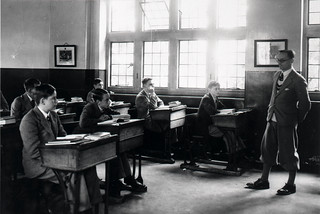 There are many aspects of academic life that we have little control over. One of the most significant of these aspects is also one of the most invisible, because it comes with a kind of take-it-for-grantedness: the actual physical space of the campus. The classrooms, the libraries, the study spaces and public places—we spend so much of our time in these locations, but they aren’t ours. They are institutional entities, designed by committees, subject to cost analysis, and rarely built to foster individualized teaching, learning, and research styles and goals.
There are many aspects of academic life that we have little control over. One of the most significant of these aspects is also one of the most invisible, because it comes with a kind of take-it-for-grantedness: the actual physical space of the campus. The classrooms, the libraries, the study spaces and public places—we spend so much of our time in these locations, but they aren’t ours. They are institutional entities, designed by committees, subject to cost analysis, and rarely built to foster individualized teaching, learning, and research styles and goals.
I propose a THATCamp session in which we think about ways to hack campus space. And I mean hack in the most generous sense of the term. How can we use these spaces in ways they weren’t designed for? How can we turn their flaws—bolted down desks, windowless rooms, tiered seating, and so on—into advantages (or at least neutralize them)? How can we turn institutional places into dwelling spaces that we inhabit and habituate?
I was initially thinking mostly of classrooms—because I have taught in dreadfully designed rooms—but I’d extend this idea to include all campus spaces. And I’d like our hacks to go beyond the simply practical (though we need those too) to include what amounts to philosophical and ideological hacks. What would a temporary autonomous zone look like on campus, in the student union, in your classroom? How can we change attitudes about what can or can’t be done in certain spaces? What’s the most surprising thing we can do with a campus space, and conversely, what’s the most predictable thing we can do in a new way?
Image: United Kingdom National Archives. What’s the Lesson? 2009. 3 May 2012. <www.flickr.com/photos/nationalarchives/4128460122/>.


I love this idea. I spend a perverse amount of time thinking about the physical spaces I work in, without making as much of an impact as I’d like. I’ve also worked alongside many colleagues at Georgia Tech who actively work to disrupt the campus spaces around them, and it’s time I start doing so too.
Oh I want IN. I also think we need to talk about the reasons we want/need to hack space in the first place–what things are we capable of doing (thanks to digital tools, alternate pedagogies) that just weren’t on the table when traditional campus spaces were set up.
I dig it. I’m on a committee at my campus currently thinking about these issues. We made a field trip to UNCC where we were shown many very cool examples of innovative learning spaces. (Flickr pix are here.) I’d love a THATCamp conversation about the topic.
Pingback: DCW Volume 1 Issue 1 – Plugging In, Plugging Out